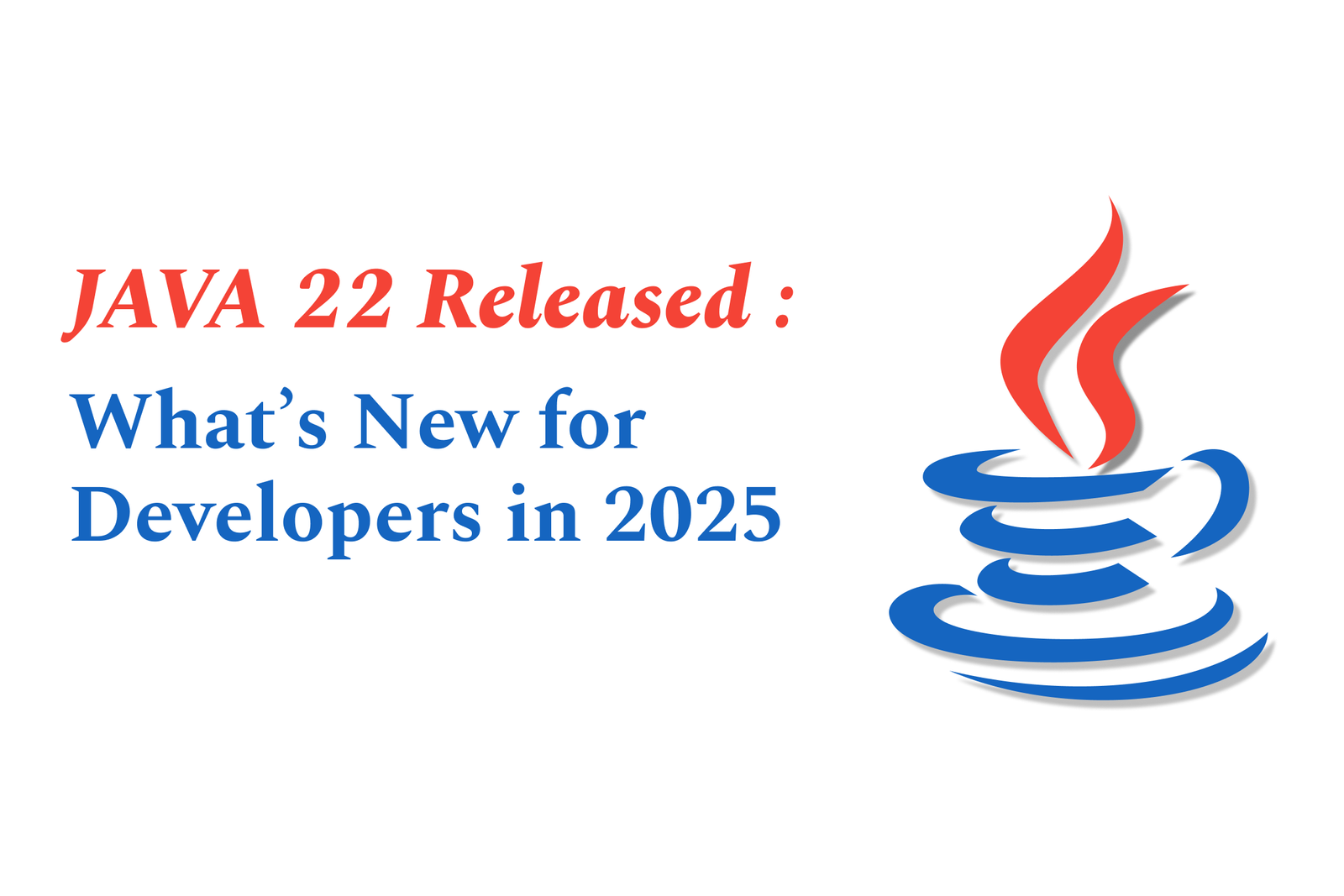Java 22 released: what?s new for developers in 2025
Java 22, released for 2025, brings major enhancements in performance, security, and developer tools, featuring 12 new JEPs. It advances Java’s language and runtime, empowering developers to build faster, scalable, and modern applications while embracing cloud, AI, and cutting-edge tech.
Java 22 Released: What's New for Developers in 2025
1 ) Overview of Java 22 Release
Oracle announced the release of Java 22, the latest iteration of the world's leading programming language and development platform. Java 22 introduces over a thousand improvements targeting performance, stability, and security to enhance developer productivity and innovation across various organizational applications.
2 ) Key Enhancements and Features
Java 22 incorporates 12 JDK Enhancement Proposals (JEPs) that improve both the Java language itself and the development toolkit.
Notable improvements affect APIs, runtime performance, and development tools bundled in the Java Development Kit (JDK).
These updates are designed to help developers build scalable, secure, and feature rich applications more efficiently.
3 ) Java Versioning Context and Ecosystem Changes
Since JDK 9, rapid Java releases have introduced features like Text Blocks, new HttpClient API, Records, and pattern matching, culminating in Java 22’s enhancements.
Java 21 remains the latest long term support (LTS) version, while Java 22 builds on it with cutting edge features.
The Java ecosystem is evolving quickly, with supporting frameworks like Spring 6.0, Spring Security 6.0, and Spring Boot 3.0 also being updated, reflecting the fast pace of technological advancement expected in 2025.
4 ) Developer Recommendations for 2025
Java programmers are encouraged to deepen their mastery of newly introduced Java features and language enhancements.
Learning and refining skills in Git for version control is highlighted as critical, especially command line proficiency for better source code management.
Expanding knowledge in cloud technologies, microservices, and DevOps tools such as Docker, Kubernetes, Jenkins, and major cloud platforms (AWS, Azure, Google Cloud) is essential to stay relevant.
Embracing AI tools and productivity technologies, including prompt engineering and large language models like ChatGPT, is becoming increasingly important for modern developers.
5 ) Tools and IDE Support
The Eclipse IDE has announced support for Java 24, preparing developers for future developments and offering improved tooling for features like pattern matching and modular source files.
Continuous updates and improvements in development environments play a significant role in maintaining developer efficiency and adapting to new Java versions.
6 ) Looking Ahead
Java 22 is available under Oracle’s no cost terms, with updates supported until JDK 25’s planned release in September 2025.
JavaOne conference is scheduled to return to the San Francisco Bay Area in 2025, signaling a continuing commitment to community engagement and developer collaboration.
Summary
Java 22 marks a significant milestone with numerous improvements fostering faster, more secure, and scalable application development. Developers in 2025 are advised to embrace these enhancements while broadening their skills in modern development, cloud computing, and AI integration to fully leverage the evolving Java platform and ecosystem.
https://justacademy.in/news-detail/flutter-beta-features-worth-exploring
https://justacademy.in/news-detail/speech-recognition-in-flutter-using-ai
https://justacademy.in/news-detail/react-native-vs-nativescript:-which-one?s-winning?
https://justacademy.in/news-detail/freelancing-with-flutter-in-2025
https://justacademy.in/news-detail/new-material-3-support-in-flutter-ui-toolkit
Related Posts
In 2025, top Angular libraries offer modern, feature-rich components and tools for building dynamic web apps. From powerful data grids to low-code platforms like UI Bakery, these libraries enhance development speed, UI design, and scalability, making them essential for Angular developers.
Migrating from AngularJS to Angular 17 involves gradually upgrading your app by running both frameworks together using tools like ngUpgrade, rewriting components in TypeScript, and adopting Angular’s modern architecture to enhance performance, maintainability, and long-term support.
Angular state management tools help organize and handle app data efficiently, improving scalability and maintainability. Popular options include NgRx for robust, RxJS-based patterns, and newer Signal Store solutions that offer simpler, reactive approaches integrated tightly with Angular’s latest features.
RxJS in Angular empowers developers to manage asynchronous data streams with powerful operators like `forkJoin`, `combineLatest`, and `zip`. Mastering these key operators in 2025 is essential for building efficient, reactive applications that handle complex event sequences seamlessly.
Angular performance optimization in 2025 focuses on improving app speed and responsiveness by using techniques like OnPush change detection, lazy loading, efficient data caching, and AOT compilation. These practices reduce load times, enhance user experience, and ensure scalable, fast Angular applications.
In 2025, Angular remains preferred for large-scale, enterprise apps with its robust, all-in-one framework, while Vue attracts developers seeking simplicity and fast development for smaller projects. Both frameworks excel, with choice driven by project needs and team expertise.
Angular Signals are a new reactive primitive in Angular 16 that enable fine-grained, efficient change detection by automatically tracking dependencies and updating only affected parts of the UI. They simplify state management and boost app performance, revolutionizing Angular's reactivity model.
Angular interview questions to prepare in 2025 focus on core concepts like components, directives, data binding, routing, and dependency injection, along with TypeScript mastery and latest Angular features to ensure strong practical knowledge for building scalable, efficient web applications.
AngularJS reached its official end of support in January 2022, meaning no further updates or security patches. To ensure app security and performance, developers should consider migrating to modern Angular versions or seek third-party long-term support options if immediate migration isn’t possible.
The Angular Roadmap 2025 highlights upcoming features focused on improving developer experience and performance, including zoneless Angular, Signals integration, enhanced Forms, async data handling, improved HMR, and expanded Angular Material/CDK enhancements, driving modern, efficient web app development.










